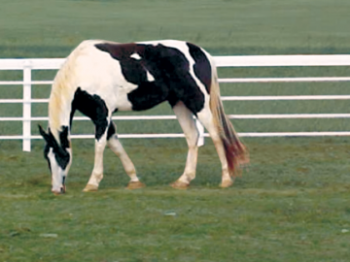Electric Tape

Over the next few months, we'll profile different fencing systems and explain why they may be helpful to you and your horses. One of our most popular electric rails is Pro-Tek Electric Tape. To understand Electric Tape and how it can be a good choice for your fencing needs, let's look at how electric fences work and some of the benefits they have for horse and owner.
In the wild, horses are herd animals, meaning there is a hierarchy among them.
Horses will respect the bite, nudge, nip or kick of a more dominate horse. Electric fencing provides that ''nip'' and helps teach horses to respect the barrier. Unlike the kick from an actual horses, the ''bite'' that is felt from an electric fence is short-lived and doesn't physically harm your horse. Electric fence works via an energy source that releases a pulse onto an insulated fence line about once every second. When a horse contacts the fence, the circuit is completed, and the animal receives a ''shock''. The current flows from the energizer, down the fence line, through the animal, to the earth, and back to the energizer via the ground rods to complete the circuit.
Electric fence can be useful in many different situations.
If your horses like to rub or chew on your existing fence system, adding electric can cut down on wear-and-tear, resulting in fewer repair bills. It can help teach horses to respect their fence as well. A very high traffic area can be along a common fence line, or ''cross fencing''(where two paddocks share common fencing). Electric used in these areas will not only help to keep horses from playing over your fence, but most often lessens the chance of injury.
Electric Tape fence is popular due to the ease of installation and many benefits it has when installed and used properly.
It can be used as permanent fencing or reused as a temporary fence by simply rolling it off or onto a plastic spool. Electric Tape is also an economical way to fence. With its low cost, rolls of tape can be kept on hand and used when needed. This highly visible tape is tensioned by hand, making it easy to install. Insulators clip closed over the tape hold it to wood posts, PVC, metal T-posts, T- Post sleeves, or fiberglass rods. Corner and end tensioners are used to hold tension on the rail. Splice buckles are simple to use and make joining or repairing sections of fence fast and easy.
Pro-Tek Electric Tape contains stainless steel wires instead of copper ones.
Stainless steel wires won't oxidize, corrode or turn green over time like copper. Conductivity is also stronger with stainless steel, so this fence won't lose its initial strength over time. Stainless steel also gives Electric Tape a long life expectancy, often extending the product life beyond the 20-year warranty (for the 1.5 inch width of tape). Pro-Tek Electric Tape is also protected from the suns damaging rays by a UV guard.
Electric Tape comes in 1.5 inch and 1/2 inch widths.
The 1.5 inch Tape carries a 20-year warranty and is available in white, black and brown. 1.5 inch Electric Tape has 750 lbs. of break strength per rail, and it comes in three different roll lengths to fit your needs. The 1/2 inch Tape carries a one-year warranty and is only available in white. This width of tape is intended for temporary use. With low cost, simple installation, high visibility, and long life, Electric Tape does a big job for such a simple rail.
As with all electric fencing, periodically walk your fence line to make sure weeds and grass aren't growing up and contacting your fence rails.
Be sure to trim your fence line regularly, and keep it free from branches and other debris. You may choose to use a grass and weed killing product under your rails and around posts. This greatly cuts down on maintenance and labor. A fence alert is a small investment that you will definitely appreciate. It clips to your fence and flashes if the voltage becomes low or erratic, alerting you to potential problems.
The safest way to use any electric fence is to keep it turned on at all times.
Electric Tape works best by following manufacturer's instructions for proper installation. Always use lighting protection, and always use a proper ground rod kit that consists of at least three ground rods and the parts necessary for installation. If you live in an area where lighting becomes an issue, or for added protection, consider using a lightening diverter. It can save your charger from a lightning strike. This can save money and make sure your horses are still behind an electrified fence.
No matter what fencing option you consider, it's important to remember that horses are wild animals and their behavior can be unpredictable.
Although Electric Tape is a safer alternative to fencing options of the past (bare wire, barbed wire, board fencing), there is no totally safe fence. Accidents can happen with any fencing product, and that's why following installation instructions and manufacturer's suggestions is so important. Do everything you can to set up your fencing correctly, and you will greatly reduce the risk of injury to your horses.
One of the biggest misconceptions we see is the belief that post spacing greater than 12 feet is just fine.
With horses, closer post spacing is best. We recommend 12 foot post spacing for most pastures, and 8 -10 foot post spacing for high traffic areas or smaller paddocks. Although some companies will suggest farther post spacing to save money on posts, this will compromise the integrity of your fence and put your horses at a much greater risk.
Although the break strength of the fence will remain the same no matter what post spacing you use, the ''give'' of the fencing will change dramatically. RAMM's Electric Tape is designed to flex 4 or 5 inches on impact before coming back into place, or breaking free if your horse puts over 750 lbs. of pressure on the rail. With the 8, 10 or 12 foot post spacing we recommend, the fence is able to do it's job and either come back into place, or release so your horses is less likely to get tangled or possibly injured.
If posts are set at 25 feet, 50 feet or even 100 feet as some companies suggest, the fencing will give up to 5 feet or more before either breaking or coming back into place.
This puts your horse at a much greater risk of getting tangled in the fencing and possibly injured. The money you would save on using fewer posts would likely pale in comparison to the vet bill and heartbreak you would go through with an injury.
We take the safety and well-being of your horses seriously and make recommendations based on our years of experience in the fencing field.
Working with a professional for your fencing project is important because they will be able to share their knowledge with you and help you make safer choices. If you don't understand how a particular product works, or if you have questions on any safety issues, ask them during your planning stage. It's important to know the facts about your fencing system before you install it on your property. Our staff is here to help and answer any questions you have along the way.
Electric Tape may be a simple electric rail, but it truly does the job.
Electric Tape has fast become a popular choice for many horse owners. With cold weather on the way, be sure to get your winter repairs and projects done soon. Be sure to protect your existing fence, or consider using Electric Tape by itself. If you think Electric Tape or any of RAMM's other fence options might be the right choice for your fencing needs, contact us. A member of our staff will explain and help you select the accessories you need to build this fence properly.
 Debbie has over 45 years experience with horses and equine-related businesses. She has owned, trained, boarded horses and run stables at various times in her career. She is a certified fence installer, has given balanced riding lessons, and has shown horses in Western, Western Pleasure, Trail, English, Hunter/Jumper, Fox Hunting, Hunter Trials, Dressage and driving classes. Debbie has been involved in foaling, and just about every aspect of horse ownership possible, and she welcomes your questions and comments. If you are interested in using any articles by Debbie, please send her an email.
Debbie has over 45 years experience with horses and equine-related businesses. She has owned, trained, boarded horses and run stables at various times in her career. She is a certified fence installer, has given balanced riding lessons, and has shown horses in Western, Western Pleasure, Trail, English, Hunter/Jumper, Fox Hunting, Hunter Trials, Dressage and driving classes. Debbie has been involved in foaling, and just about every aspect of horse ownership possible, and she welcomes your questions and comments. If you are interested in using any articles by Debbie, please send her an email.
RAMM Fence Systems, Inc. makes every effort to provide reliable and useful information on horse health, care and products. The statements made on this website are based on years of experience with horses, however, they are based on generalized situations and should not replace diagnosis or treatment by a veterinarian or consultation by a professional. RAMM Fence Systems, Inc. does not assume any legal responsibility. Readers should always consult qualified health care providers for specific diagnosis and treatment.
